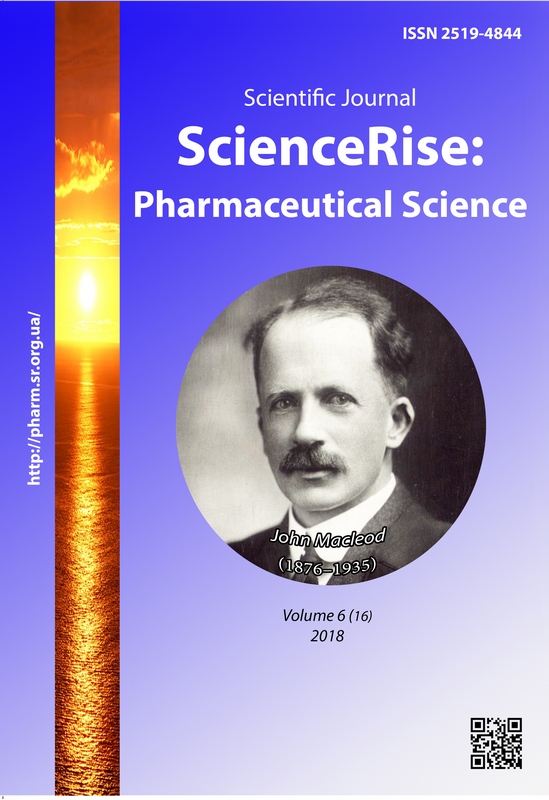Research of socio-psychological characteristics of pharmacy specialists
DOI:
https://doi.org/10.15587/2519-4852.2018.153381Keywords:
social and psychological characteristics, pharmacy specialist, psychodiagnostic methods, conflict resistance, tact, organization, hard workAbstract
The purpose of the article is to study the socio-psychological characteristics of Ukrainian pharmacists.
Methods: methods of psychodiagnostic analysis, expert assessments, analytical, comparative and logical. The survey involved 352 pharmacist practitioners from all regions of Ukraine.
Results. In the context of introducing the proper pharmacy practices in pharmacies and aggravating the socio-economic situation in the country, pharmacy specialists face the issue of providing pharmaceutical assistance to pharmacy visitors at an appropriate professional level, for which they need a certain set of socio-psychological characteristics. Evaluation of these characteristics was carried out using the methods of diagnostics of systemic-characterological relations, resistance to conflicts, level of subjective control, MPI (G. Aysenck), SSB-98 (Self-regulation style of behavior), volitional qualities by N. Stambulova. The proposed methods allowed us to identify the inherent qualities of specialists, namely, the average level of indicators of self-control and endurance, initiative, creativity and independence. At the same time, pharmacy specialists overcome obstacles to achieve the goal, but show a certain softness, they are also not always confident in making decisions, they are prone to doubt. The willful sphere of the interviewed pharmacists is characterized by a tendency towards uncertainty and lack of initiative. Most pharmacists have poorly defined leadership qualities and an average level of conflict resistance. 22,03 % of pharmacy specialists have a high level of conflict, 8,48 % of respondents have a pronounced conflict level.
Conclusion. The socio-psychological characteristics of pharmacy specialists were studied using psychodiagnostic methods. According to the test, the system-characterological relations of the individual determined that tactics, integrity, responsiveness, organization, diligence, self-criticism, self-confidence, accuracy, frugality and moderation in needs are characteristic of most pharmacy specialists, but there is a definite need to develop or improve these qualities. Pharmacy specialists are also characterized by an average value of the level of subjective control. The willful sphere of the interviewed pharmacists is characterized by partial uncertainty and lack of initiative
References
- Dovidnyk kvalifikatsiinykh kharakterystyk profesii pratsivnykiv. Vypusk 78 “Okhorona zdorov'ia” (2002) Available at: http://consultant.parus.ua/?doc=0B7Y6D7812
- Galkovskaya, G. (2015). Farmatsevtycheskaia praktyka v Brytanyy y Hermanyy. Zakonodatel'stvo y tendentsyy. Ezhenedelnyk Apteka, 47. URL: http://www.apteka.ua/article/353365
- Raihorodskyi, D. (2017), Praktycheskaia psykhodyahnostyka [Practical psychodiagnostics]. Moscow: Bakhrakh-M, 672.
- Pov'iakel, N. I. (2012). Psykhoprofilaktyka konfliktiv [Psychoprophylaxis of conflicts]. Kyiv: Shkilnyi svit, 122.
- Atemasova, O. A. (2010). Praktychna psykholohiia [Practical Psychology]. Kharkiv: Ranok, 160.
- Halii, L. V. (2011). Theoretical and scientific-practical bases of definition of competencies in personnel management of pharmaceutical establishments. Kharkiv.
- Tolochko, V. M., Halyi, L. V. (2009). Model' kompetentsiy provizora apteki. Provyzor, 15, 7–9.
- Pestun, I. V., Mnushko, Z. M. (2017). Ohliad suchasnykh tendentsij profesijnoi diial'nosti provizoriv (farmatsevtiv) v Ukraini ta za kordonom. Sotsial'na farmatsiia v okhoroni zdorov'ia, 1, 52–59.
- Whitmarsh, S., Futter, B., Rouse, M., Bates, I., Anderson, C. (2010). A Case Study in Terminology: the FIP Pharmacy Education Taskforce. American Journal of Pharmaceutical Education, 74 (7), 134. doi: http://doi.org/10.5688/aj7407134
- Sternberg, R. J., Kaufman, J. C.; Sternberg, R. J., Kaufman, J. C. (Eds.) (2010). Constraints on Creativity: Obvious and Not So Obvious. The Cambridge Handbook of Creativity. Cambridge University Press, 467–482. doi: http://doi.org/10.1017/cbo9780511763205.029
- Stupans, I., Atkinson, J., Meštrović, A., Nash, R., Rouse, M. (2016). A Shared Focus: Comparing the Australian, Canadian, United Kingdom and United States Pharmacy Learning Outcome Frameworks and the Global Competency Framework. Pharmacy, 4 (3), 26. doi: http://doi.org/10.3390/pharmacy4030026
- Barnett, M., Frank, J., Wehring, H., Newland, B., VonMuenster, S., Kumbera, P. et. al. (2009). Analysis of Pharmacist-Provided Medication Therapy Management(MTM) Services in Community Pharmacies Over 7 Years. Journal of Managed Care Pharmacy, 15 (1), 18–31. doi: http://doi.org/10.18553/jmcp.2009.15.1.18
Downloads
Published
How to Cite
Issue
Section
License
Copyright (c) 2018 Marianna Harkusha

This work is licensed under a Creative Commons Attribution 4.0 International License.
Our journal abides by the Creative Commons CC BY copyright rights and permissions for open access journals.








